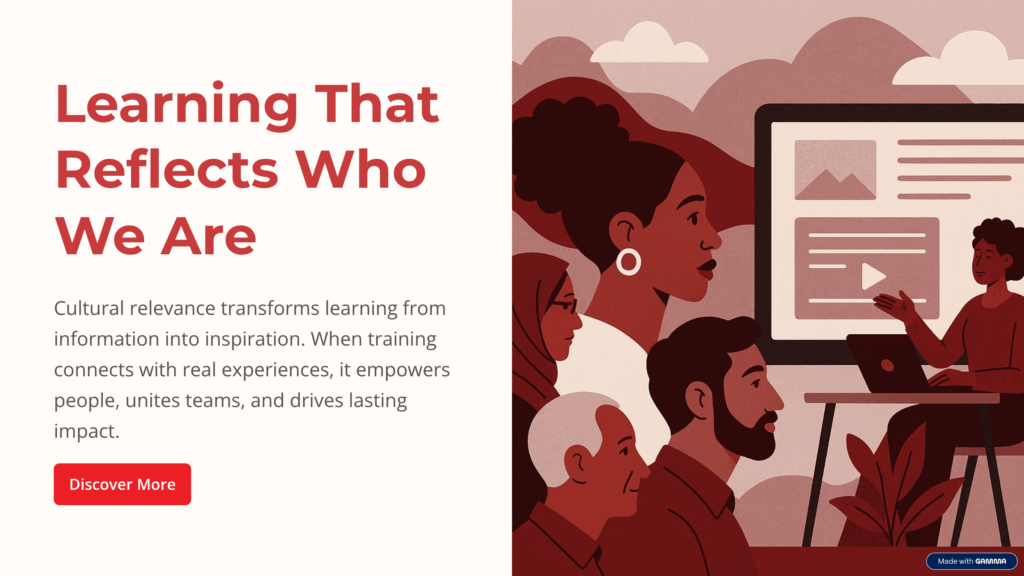
eLearning solutions in South Africa cannot succeed if they overlook the cultural realities of the people they are designed to serve. In a country shaped by diversity (where 11 official languages and a wide spectrum of traditions, values, and lived experiences coexist) learning must speak directly to context.
Table of Contents
When training content reflects the identities and realities of its learners, it resonates on a deeper level. Employees feel recognised, not generalised. They engage more fully, retain information for longer, and apply it with confidence in their workplace.
Conversely, when programmes rely on imported, one-size-fits-all models, learners quickly disengage, and organisations miss the opportunity to build trust and alignment across teams.
South Africa’s Unique Learning Landscape
South Africa’s workplaces reflect one of the most diverse learning environments in the world. With varied cultural traditions, and a wide range of socio-economic realities, employees bring different perspectives, communication styles, and expectations into training spaces. This richness offers opportunity, but also creates complexity for organisations seeking to deliver effective learning.
Imported training programmes may overlook the importance of local idioms, workplace practices, or even the way respect and hierarchy are expressed across cultures. When learners feel that examples, case studies, or scenarios do not reflect their own reality, the result is lower engagement and weaker knowledge transfer.
Strategies for Building Culturally Relevant eLearning in South Africa
Designing training that resonates with South African learners demands thoughtful integration of culture, context, and creativity. Below are key strategies that help ensure eLearning connects meaningfully with diverse audiences.
Language Integration
Language shapes understanding and belonging. Offering multilingual modules or incorporating local terminology helps learners engage with content in a way that feels natural. Even small gestures (such as including greetings or phrases in familiar languages) signal inclusivity and respect.
Storytelling Rooted in Local Context
Stories are powerful tools for learning, but only when they reflect lived realities. Case studies and scenarios that draw from South African workplaces, industries, and communities allow learners to see themselves in the content. This not only improves comprehension but also strengthens relevance and application.
Representation and Inclusivity
Visuals, characters, and examples should reflect the diversity of South Africa’s workforce. Inclusive design avoids stereotypes and instead highlights the richness of identity, creating learning spaces where every participant feels acknowledged and empowered.
Collaboration with Local Experts
Partnering with subject-matter experts who understand cultural nuances ensures accuracy and authenticity. These collaborations provide insights that extend beyond content to include tone, context, and delivery, creating eLearning that feels both professional and relatable.
Long-Term Value of Contextual Learning for Organisations
Contextual learning delivers benefits that extend well beyond the completion of a training module.
Driving Sustainable Performance
When content reflects learners’ lived experiences, engagement and retention increase, leading to improved workplace performance. Over time, this alignment between training and real-world application translates into measurable productivity gains.
Strengthening Inclusivity and Trust
By acknowledging the diversity of South Africa’s workforce, organisations foster trust and unity across teams. This creates a culture where employees feel recognised and respected, regardless of background.
Reducing Turnover and Boosting Satisfaction
Employees who feel understood are more likely to remain committed to their organisation. Culturally relevant learning reduces disengagement and enhances job satisfaction, contributing to lower turnover rates and stronger employee loyalty.
Building Organisational Resilience
The long-term value of culturally grounded eLearning is its ability to prepare organisations for change. By empowering teams with context-driven skills and knowledge, leaders ensure their workforce can adapt with confidence to shifting industry demands and future challenges.
Turning Cultural Relevance into Lasting Impact
The choice is clear: learning that speaks to context drives results that last. Now is the time for leaders in HR, training, and education to rethink their current approaches and invest in solutions that truly connect with their people.
Ready to create eLearning that inspires, includes, and delivers measurable impact?
Contact Anderson Studios today to explore tailored solutions that put cultural relevance at the heart of workplace learning.

